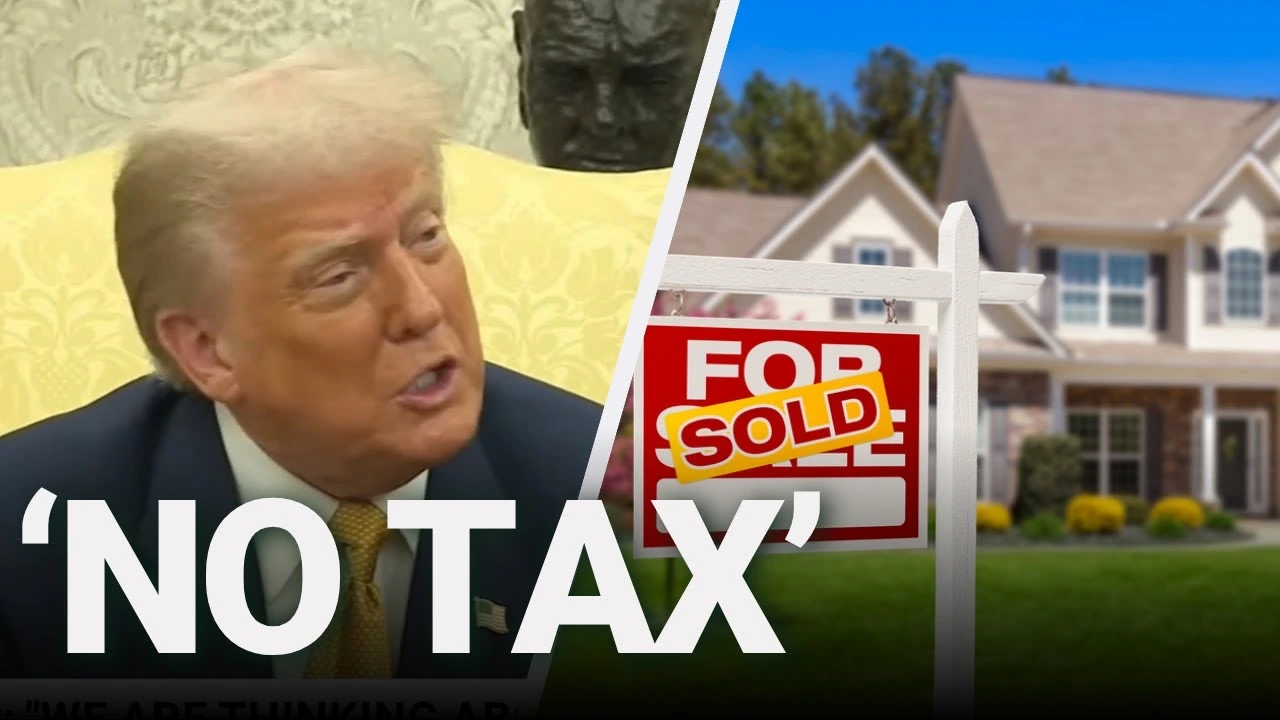President Trump is thinking about removing capital gains taxes on home sales. Here’s how the current system works, who benefits, and what changes could mean for homeowners.
Table of Contents
Trump Says He Is ‘Thinking About’ Nixing Capital Gains Tax on Home Sales—Here’s What That Could Mean for Homeowners
In a surprise comment on Tuesday, President Donald Trump told reporters that his administration is considering a move that could significantly change the real estate landscape: eliminating the capital gains tax on home sales.
“We are thinking about … no tax on capital gains on houses,” Trump said.
The remark was quickly interpreted by some — including Rep. Marjorie Taylor Greene, who has introduced a bill in Congress on the subject — as an early endorsement of legislation to abolish the tax when someone sells their primary residence.
While there’s no guarantee the proposal will move forward in Congress, it’s a potentially massive shift in U.S. tax law that could affect tens of millions of homeowners, especially in states with surging home prices like California, Colorado, and Massachusetts.
Here’s a breakdown of what capital gains taxes on home sales look like today, who would benefit from a repeal, and the broader impact such a change could have.
What Is the Capital Gains Tax on Home Sales?
When you sell your primary residence, the capital gains tax may apply if your sale earns you a profit — that is, you sell the house for more than you originally paid, after accounting for certain costs like improvements and closing fees.
However, current U.S. tax law already provides a generous exemption:
- $250,000 of capital gains is exempt if you’re single
- $500,000 is exempt if you’re married filing jointly
These thresholds apply only if you have lived in the home for at least two years out of the previous five before selling.
Short-Term vs. Long-Term Gains
- If you sell your house within one year of buying it, the IRS considers the gains short-term, and they are taxed at ordinary income tax rates.
- If you’ve held the home more than one year, the gains qualify as long-term, and the rates are usually lower than your regular income tax rate.

Who Actually Pays Capital Gains Taxes on Homes Today?
Due to the $250K/$500K exemption, many home sellers pay no capital gains tax at all.
But that’s beginning to change — not because of a law, but because of home price inflation.
According to the National Association of Realtors (NAR):
- 29 million homeowners already have enough equity to exceed the $250,000 cap
- 8 million may exceed the $500,000 cap
- By 2035, nearly 70% of homeowners could see capital gains over $250,000
- And 38% may exceed $500,000
These gains are more likely in areas like:
- California
- Massachusetts
- Colorado
- New York
- Washington, D.C.
This means a growing number of long-term homeowners, particularly those in high-priced markets, may owe thousands or even tens of thousands of dollars in capital gains taxes if they sell.
Trump’s Proposal: A Windfall for the Wealthy or a Boost to Mobility?
If Trump were to follow through and eliminate capital gains taxes on primary residences altogether, the change would mostly benefit older and wealthier homeowners — at least in the short term.
An analysis by the Yale Budget Lab, using Federal Reserve data, found:
- Homeowners with gains above the current exemption have an average net worth of $5.7 million
- Those below the exemption average just over $1 million
In other words, the richest homeowners stand to benefit the most if capital gains taxes are scrapped.
That said, the NAR argues the change could help address a broader problem: homeowners staying put too long because selling would trigger a large tax bill.
“Home price inflation has eroded the value of these exemptions,” said the NAR report. “This disincentivizes downsizing, relocating, or moving into retirement communities.”
How the Current Tax Rates Work (2025)
If your capital gains on a home sale exceed the exemption, your tax rate depends on your income:
| Filing Status | Income Range | Capital Gains Tax Rate |
|---|---|---|
| Single | Up to $48,350 | 0% |
| Single | $48,351 – $533,400 | 15% |
| Single | Over $533,400 | 20% |
| Married Filing Jointly | Up to $96,700 | 0% |
| Married Filing Jointly | $96,701 – $600,050 | 15% |
| Married Filing Jointly | Over $600,050 | 20% |
Note: Rates may also include a 3.8% Net Investment Income Tax for higher earners.

Who Could Lose Out If the Tax Is Removed?
While eliminating capital gains taxes on home sales sounds like a win for all, there are potential downsides and costs:
1. Federal Budget Impact
The capital gains tax generates billions of dollars in revenue for the U.S. government. Removing it could:
- Worsen the federal deficit
- Create new budgetary challenges amid rising interest rates and growing entitlement obligations
This comes just weeks after Trump signed a massive tax and spending bill that the Congressional Budget Office says will add $3.4 trillion to the deficit over 10 years.
2. Housing Market Distortions
Some economists warn that removing the tax could lead to:
- Artificial home price inflation, as buyers and sellers respond to new tax incentives
- Increased pressure on supply in already-tight housing markets
- More speculative buying, especially in high-income brackets
3. Equity Concerns
Critics argue the move favors the wealthiest homeowners, many of whom already benefit from deductions and long-term appreciation.
It may offer little to no help for:
- First-time homebuyers
- Renters
- Low-income homeowners with limited gains
Political Outlook: Will It Happen?
Right now, Trump’s remark is just a statement, not a formal policy.
But the political momentum is growing:
- Rep. Marjorie Taylor Greene has introduced a bill to eliminate the tax
- Housing affordability is shaping up to be a top election issue in 2026
- Trump’s base includes many older, wealthier homeowners, who may welcome the move
Still, it faces significant opposition from fiscal conservatives and deficit hawks, especially after the recent tax cuts bill drew harsh scrutiny for expanding the deficit.
Whether Congress will prioritize this proposal remains unclear — but homeowners, real estate agents, and tax advisors are now paying attention.
What Should Homeowners Do Now?
If you’re planning to sell your home in the next few years, here’s what to consider:
- Understand Your Exemption
Know whether you qualify for the $250K/$500K exemption. You must have lived in the home for at least two years out of the past five. - Track Home Improvements
Keep detailed records of any renovations or repairs. These can increase your cost basis and reduce taxable gains. - Consult a Tax Professional
If your gains exceed the exemption, professional advice is crucial for accurate tax planning. - Watch Legislative Developments
Stay informed. If Trump’s proposal gains traction, it could shift the best timing for your home sale.
FAQs
1. What is the capital gains tax on a home sale?
It’s a tax on the profit you make when selling a home. You may be able to exclude up to $250,000 (single) or $500,000 (married filing jointly) from taxation.
2. Who benefits most from Trump’s proposed elimination?
Mainly wealthier homeowners with large appreciation, especially in high-priced housing markets.
3. How do I qualify for the current tax exemption?
You must have lived in the home as your primary residence for at least two of the past five years.
4. Does this apply to second homes or rental properties?
No. Different, often stricter rules apply for second homes and rental investments.
5. Is the proposal likely to pass?
Unclear. While it has support from some in Congress, budget concerns and political opposition may prevent it from becoming law soon.
